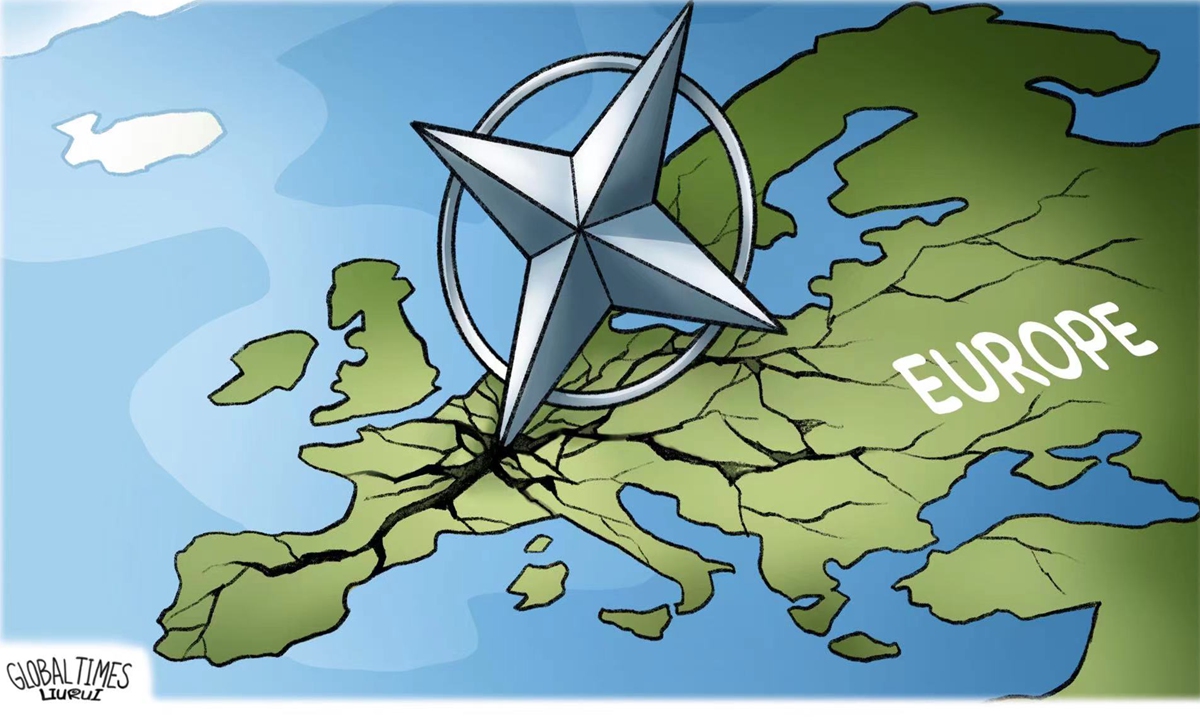
Europe deeply split on warmongering NATO Illustration: Liu Rui/GT
As the Russia-Ukraine crisis drags on, NATO has become the pronoun of destabilizer of regional security.The situation in the Balkans is now at an explosive point. KFOR, the NATO-led peacekeeping force in Kosovo, clashed with Serb protesters on Monday. The tension arose after ethnic Albanian mayors took office in northern Kosovo's Serb majority area after April elections that the Serbs boycotted.
Kosovo and Serbia have long-running tensions. Kosovo was originally an autonomous province of Serbia in the former Yugoslavia. With the support of the US and the West, Kosovo has been seeking to move further on the road of "independent statehood" and adopted a hardline attitude toward Serbia. NATO's involvement has further exacerbated the rift between Kosovo and Serbia, leading to military conflicts between the two sides and undermining the peace and unity of the Western Balkans.
As the situation escalates, NATO chief Jens Stoltenberg has called on Kosovo to tone down tensions with Serbia. But it remains doubtful if NATO truly wants to stop the conflict. The NATO-led multinational contingents were deployed to four municipalities in Kosovo to contain "violent demonstrations" as "newly elected mayors in recent days tried to take office," KFOR said in a statement.
NATO calls for easing tensions on one hand, but on the other hand, increases military presence. It seems that NATO is just buying time to arm Kosovo, analysts argued. From its past wars, it's clear the US is quite good at pretending fairness in stopping a fight while helping one side, buying time for those it supports by calling for a ceasefire. The promises made by NATO and other Western countries to protect the Serbs in Kosovo simply cannot be fulfilled. An article in the Financial Times said that the West's push to heal the divide between Serbia and Kosovo is ill-fated.
Song Zhongping, a Chinese military expert and TV commentator, told the Global Times that NATO forces did not truly engage in peacekeeping in Serbia and Kosovo, but rather aimed to maintain the basic fact of "Kosovo's independence" and helped Kosovo oppress Serbs. Serbia's sovereignty and national security aren't NATO's priority.
"The Russia-Ukraine conflict has not yielded any results for peace, and there is a possibility of escalation. The possibility of renewed conflict in the Balkans also exists. Because the Russia-Ukraine conflict has not achieved the desired effect for the US, Washington needs to create a new war on the European continent," Song said.
From the perspective of the US, the country is not concerned about the possibility of more wars breaking out in Europe, as it is not directly involved in the region. Washington can withdraw its military forces at any time. Washington actually hopes to see chaos in Europe, as well as the mess of the European economy and Europe's dependence on the US. The US does not want a united and strong Europe to exist. Meanwhile, as the Russia-Ukraine conflict has consumed much of the US energy and resources, the US is likely to view the worsening rift between Serbia and Kosovo as an opportunity that it can take advantage of to weaken Russia's influence in Serbia and the Balkans.
The ultimate goal of the US is to have both Europe and Russia suffer losses, which is more in line with its global strategy and hegemonic interests. Now the US sees Europe as two powder kegs, one in a hot war and one about to explode. In Washington's eyes, Europe's crisis is an opportunity for the US to take advantage of.

